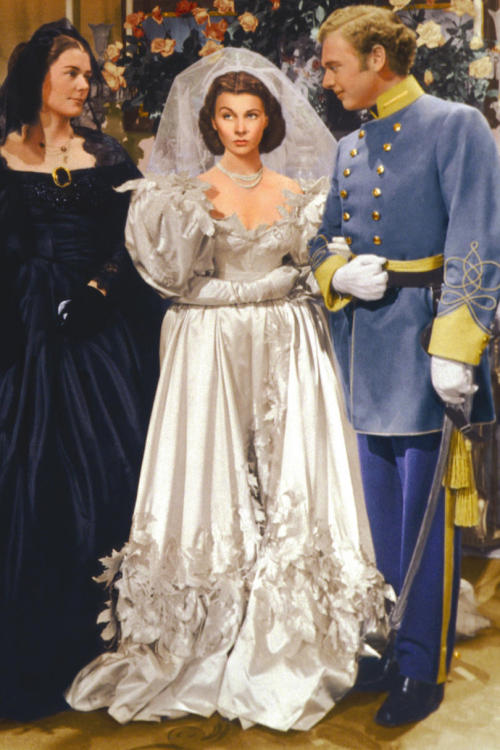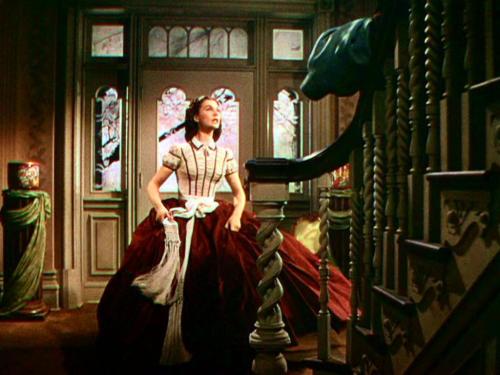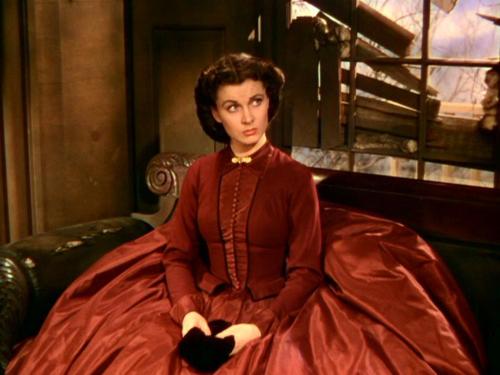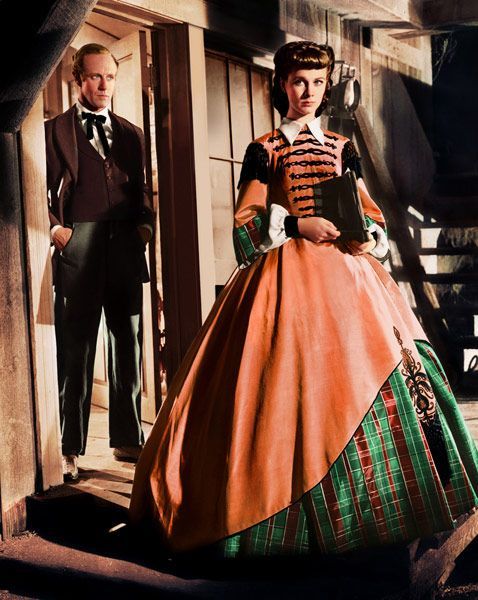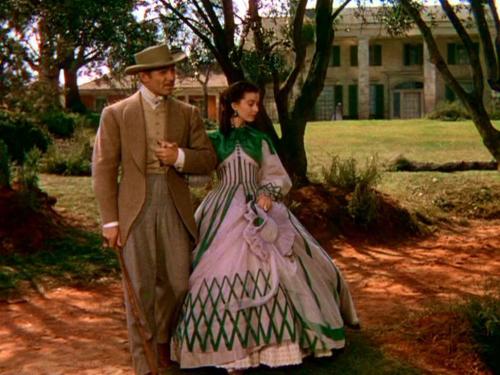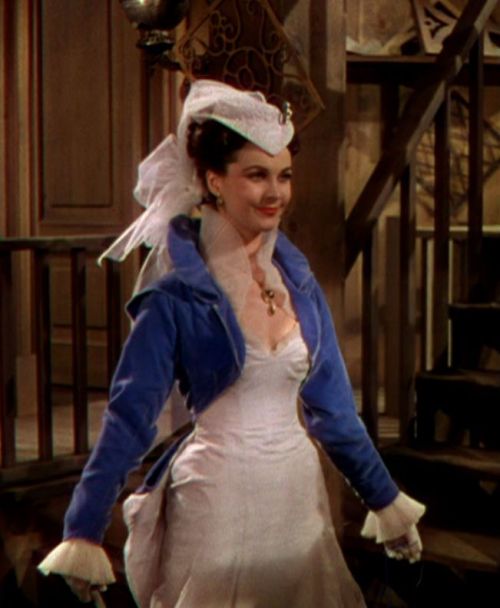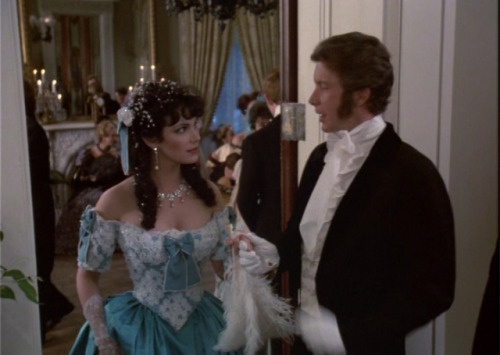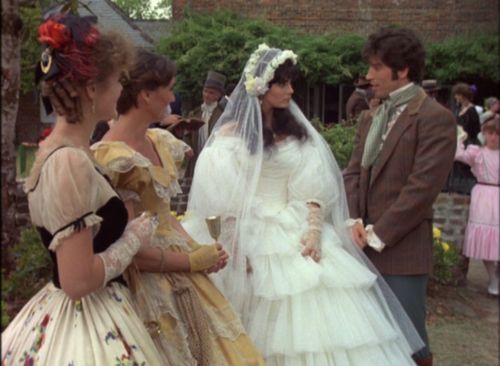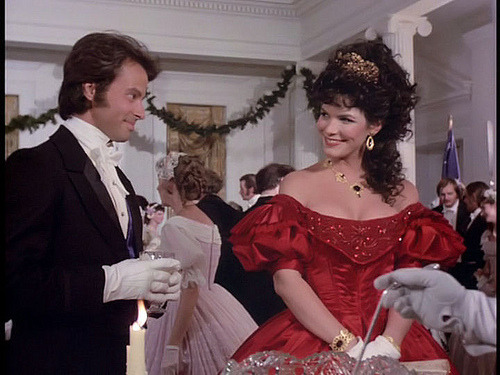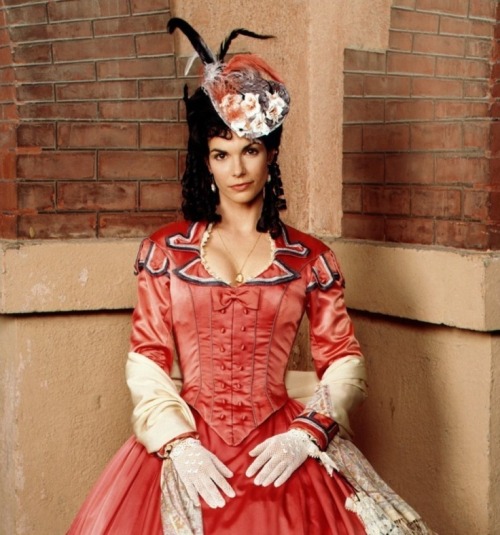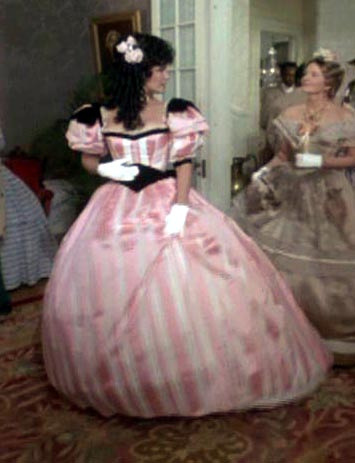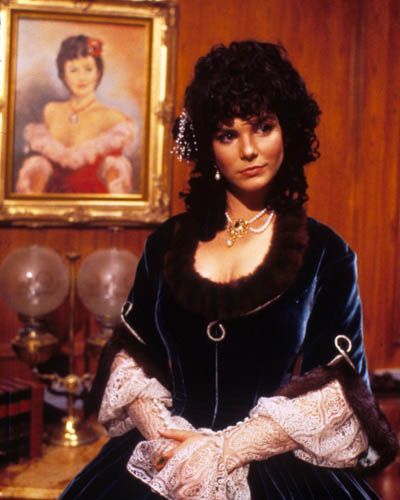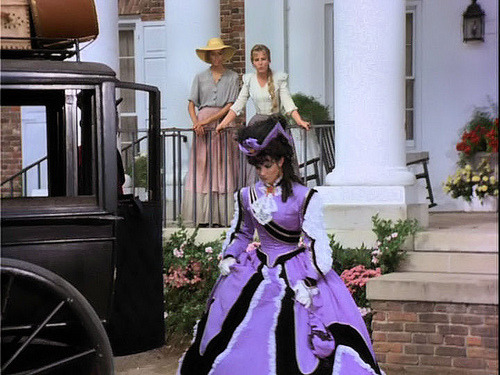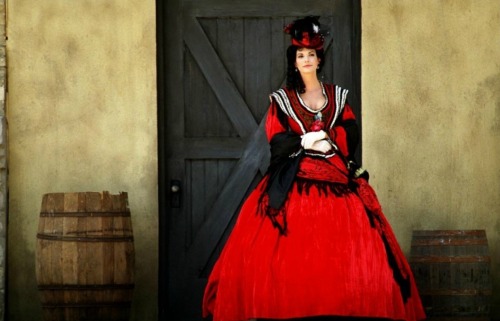
"NORTH AND SOUTH" (1982) Book Review
During the first twenty years or so following his graduation from college, John Jakes spent that period writing many short stories and novels that featured science fiction, fantasy, westerns and the occasional historical fiction. Then he achieved literary success in the 1970s with the publication of The Kent Family Chronicles, a series of eight novels about the history of a single family between 1770 and 1890. Three years after the publication of that series' last novel, Jakes embarked upon another literary series called the North and South Trilogy.
The North and South Trilogy was a literary series that depicted the lives of two wealthy families - the Hazards of Pennsylvania and the Mains of South Carolina - during the years before, during and immediately after the U.S. Civil War. The first novel, 1982's "NORTH AND SOUTH", began with the establishment of the two families when their founders immigrated to the New World in the late 17th century. The novel jumped a century-and-a-half later when George Hazard, son of a wealthy Pennsylvania iron industrialist; and Orry Main, the son of a South Carolina rice planter met as cadets at the United States Military Academy at West Point in 1842. The pair immediately become fast friends as they endure the brutal hazing of an older sadistic cadet from Ohio named Elkhannah Bent, and action during the Mexican-American War. The friendship between the two young men eventually develops into a connection between their respective families as they become acquainted with each other during family trips to the Newport summer resorts and Mont Royal, the Mains' rice plantation in the South Carolina low country. The two families consist of:
The Hazards
*George Hazard - one of the main protagonists, who is like his father, an iron industrialist
*Constance Flynn Hazard - George's Irish-born wife and an abolitionist
*Stanley Hazard - George's older brother, an incompetent businessman who left the iron trade to become involved in politics
*Isobel Truscott Hazard - Stanley's shrewish and social-climbing wife
*Virgilia Hazard - George's only sister and die-hard abolitionist
*Billy Hazard - George's younger brother
*Maude Hazard - the Hazard family's matriarch
*William Hazard - the Hazard family's patriarch and iron industrialist
The Mains
*Orry Main - one of the protagonists, who becomes a rice planter like his father
*Cooper Main - Orry's older brother and owner of a shipping company who harbors moderate abolitionist views
*Ashton Main - Orry's younger sister and die-hard secessionist
*Charles Main - Orry's young cousin, who is saved from a future as a wastrel by Orry
*Judith Stafford Main - Cooper's wife, who also happens to be a more hardcore abolitionist than her husband
*James Huntoon - Ashton's future husband, who is also a secessionist and attorney
*Clarissa Brett Main - the Main family's matriarch
*Tillet Main - the Main family's patriarch and rice planter
Five other major characters were featured in "NORTH AND SOUTH":
*Madeline Fabray LaMotte - the daughter of a New Orleans sugar factor who marries the Mains' closest neighbor
*Justin LaMotte - the Main family's closest neighbor and rice planter, who marries Madeline
*Elkhannah Bent - The Ohio-born sadist who becomes an enemy of George and Orry during their years at West Point; and both Charles' enemy and Army commander on the Texas frontier
*Grady - James Huntoon's slave, who later escaped and became Virgilia Hazard's common-law husband
Both the Hazards and the Mains find love, marriage or both throughout the novel. George meets and marries Constance Flynn, the daughter of an Irish immigrant attorney. Orry falls in love at first sight with Madeline LaMotte. Unfortunately for Orry . . . and Madeline, they meet and fall in love as she is preparing to marry the Mains' neighbor, the brutal and venal Justin LaMotte. George's younger brother, William (Billy) Hazard II falls in love . . . first with Orry's sister Ashton Main and later, with the youngest Main sibling, Brett Main. And George's older sister Virgilia, an ardent abolitionist, meets and fall in love with Grady, who turned out to be the slave of James Huntoon, Ashton's future husband.
More importantly, "NORTH AND SOUTH" depicted the last nineteen years of American antebellum history before the outbreak of the Civil War. Through the eyes of George, Orry and their families; John Jakes conveyed readers through life at the Military Academy at West Point - first through George and Orry's eyes during the 1840s and later, through Billy and Charles' eyes during the 1850s. Although John Jakes had portrayed George and Orry's West Point experiences with more detail, the author's portrait of the Military Academy during the 1850s proved to be more interesting, as he conveyed how Billy Hazard and Charles Main struggled to maintain their own friendship amidst the growing sectional conflict that threatened to overwhelm the Academy and the nation.
What I found even more interesting is that the novel began during the 1840s - a decade in which the abolitionist movement became increasingly popular in many parts of North. Another significant event had also occurred during this decade - namely the Mexican-American War. Because of the war, George met his future wife, Constance Flynn, during a stop at Corpus Cristi, Texas; on the way to the battlefields in Mexico. The war also featured a backdrop for George and Orry's last dangerous encounter with Elkhannah Bent in the novel - during the Battle of Churabusco. The most important aspect of the Mexican-American War is that it left the United States with more Western territory to settle - including California. Although both the North and the South had been in conflict over the slavery issue for several decades, the addition of the new Western lands, along with the rise of the Republican Party in the following decade, heightened the conflict between the two regions. The conflict over whether or not slavery would be practiced in the new Western territories helped lead to the creation of the Republican Party and eventually, the election of Abraham Lincoln as the country's 16th president.
For some reason, many of today's readers seem very critical of long and thick novels. They are even more critical of a historical novel filled with a great deal of melodrama. As I have stated in my review of Jakes' 1984 novel, "LOVE AND WAR", I simply do not understand this criticism. "NORTH AND SOUTH" is a novel . . . a work of fiction. It is not a history book. Fans either complained over the presence of melodrama in Jakes' story or they complained over the abundance of historical facts that served as the novel's backstory. Like I said . . . I do not understand this mentality. Even if many literary critics have been unwilling to admit this, a great deal of melodrama have been featured in the novels of literary giants. And novelists like John Jakes have proven that one can create a first-rate novel with a solid balance of both melodrama and history.
Since "NORTH AND SOUTH" told the story of two families during the last two decades leading up to the outbreak of the Civil War, it only seemed natural that the topic of slavery would dominate its narrative. I can recall a YOUTUBE vlogger complaining that Jakes seemed a bit too "in the middle of the road" about slavery. This only seemed natural, considering the story's two main characters came from different parts of the country. Following their stints in the Army, George took over the management of his family's Pennsylvania steel manufacturing company and Orry took control of his family's rice plantation in South Carolina that included slaves. It was only natural that the novel's narrative would be about two men and their families trying to main their close friendship during the conflict over slavery.
Being slave owners, it only seemed natural that the Mains would see nothing wrong with slavery. Only three members of the family felt differently. Orry's older brother Cooper viewed slavery as a moral wrong and refused to own slaves himself when he assumed control of a shipping line acquired from a man who had borrowed money from his father. However, Cooper seemed more concerned with how emancipation would impact his family and state's economic situation than with the freedom of enslaved African-Americans. This would explain why he supported gradual emancipation. Charles Main, Orry and Cooper's younger cousin, also felt that slavery was wrong. But he was too young to understand that slavery could end and merely tolerated the institution . . . until he became a cadet at West Point. And Cooper's wife, Judith Stafford, a former teacher who had been in New England, believed in the absolute abolition of slavery and civil rights for non-whites. Yet, she rarely expressed her views to others than her husband. Despite being Northerners, the Hazard family did not begin the saga as abolitionists - with exceptions. George never gave slavery a thought until his first visit to the Mains' plantation, Mont Royal, following his and Orry's graduation from West Point in 1846. Although this visit led him to become an abolitionist, his politics remained moderate like Cooper Main's. Neither older brother Stanley, younger brother Billy, sister-in-law Isobel Truscott Hazard or his mother Maude seemed interested in abolitionism. This was not surprising since the Hazards struck me as a moderately conservative family. Only George's wife Constance and his sister Virgilia were fervent abolitionists. Virgilia's abolitionism was viewed as "fanatical" due to her unwillingness to hide her hatred of slavery and slave owners beneath a veneer of politeness.
I noticed that in the novel's second half, political moderates like George, Orry and Cooper seemed willing to blame political hardliners like Virgilia and rigid pro-slavery supporters like Ashton Main and her husband, James Huntoon for the eventual outbreak of the Civil War. I could understand their aversion toward the country being driven toward war. And I realized they believed that compromise (namely the sacrifice of any future freedom for the slaves) could prevented the outbreak of war. But unlike that YOUTUBE vlogger, I realized that Jakes was simply conveying the mindset of characters like George and Orry to his readers. If he truly believed in George, Orry and Cooper's moderate opinions regarding politics and slavery, why bother creating characters like Judith Main or Constance Hazard?
Another complaint that YOUTUBE blogger had brought up was Jakes' lack of any slave characters in the novel. I believe her complaint was at best, minimal. Unlike the two novels that followed "NORTH AND SOUTH", 1984's "LOVE AND WAR" and 1987's "HEAVEN AND HELL", I must admit that the 1982 novel featured very little in-depth characterizations of either slaves or Northern blacks. There were occasional black characters that received brief viewpoints. But "NORTH AND SOUTH" only portrayed one non-white character with any real depth - namely Grady, James Huntoon's slave, who eventually became a fugitive and later, Virgilia Hazard's lover and common-law husband. For a novel in which the topic of slavery dominated the narrative, I found this rather odd and lacking.
I also had some issues with Jakes' portrayals of his villains. Although I believe he did an excellent job of delving into their psyches, many of them were in danger of being portrayed as one-note personalities. And his worst villains seemed to be wrapped in a great deal of sexual perversion, violence or both. This especially seemed to be the case for characters like Elkhanah Bent, Ashton Main Huntoon, Justin LaMotte and the latter's nephew Forbes LaMotte. Bent is portrayed as a man with a sexual preference for anyone who happened to attract his attention - whether that person is a woman, man or child. Ashton is portrayed as a promiscuous female since the age of 14 . . . or younger. In fact, one sequence featured a visit made to West Point by her, Orry and their younger sister Brett in which Ashton ended up having sex with a handful of Northern-born cadets. Frankly, I thought Jakes had gone too far in this sequence and he seemed to portray Ashton's highly sexual nature as something ugly and perverse. He also did the same for Virgilia Hazard, whose emotions regarding abolition and black men in general seemed to ring with excessive sexuality. On the other end of the scale, Jakes portrayed other villainous characters like George's sister-in-law, Isobel, as sexually frigid; and Orry's brother-in-law James Huntoon as sexually inadequate.
By the way, why did he portray Virgilia Hazard as a borderline villain? Many fans of his saga viewed her as a villain due to her undisguised general dislike of Southerners. Yet, the novel made it clear that Virgilia also harbored a strong dislike to those Northerners who opposed abolition, regardless of whether they were fellow citizens of Lehigh Station or members of her own family. I have to be honest. I still find it difficult to view Virgilia as a villain. As a character, she was on the right side of history - not only in her support of abolition and civil rights for non-whites, but also in her embrace of interracial relationships. I found it difficult to condemn her for her beliefs.
One could condemn Virgilia for her willingness to embrace violence to end slavery. But honestly, this willingness only exposed the other characters' hypocrisy. In other words, many Americans like the other Hazards and the Mains continued to celebrate the country's use of violence to win independence from Great Britain during the late 18th century. Yet, they condemned Virgilia and other abolitionists like her for supporting the use of violence to end slavery. Even to this day, there are historians who continue to express this wish or desire that slavery had never ended via a four-year war yet see nothing wrong in celebrating the violence of the American Revolution. I do not know if Jakes had intended this, but in another sequence in the novel, Virgilia had confronted Orry and Brett Main during the pair's visit to Lehigh Station in 1859. During a quarrel between her and Orry, Virgilia pointed out that it was only natural for those who participated in evil would deny it. And she was right. No matter how decent most members of the Main family were, they participated in evil - namely slavery - for their benefit. And they saw nothing wrong with this. Northern businessmen like George also profited from their business connections to the South. In the novel, George had agreed to help finance Cooper Main's new vessel that would ship slave-produced cotton to Europe. No matter how "fanatical", violent or confrontational people like Virgilia were . . . they were right about the country's ties to slavery.
Although I love the novel overall, there were segments that I really enjoyed. Among them were George's first visit to Mont Royal, Constance's early clashes with sister-in-law Isobel, the Hazard and Main families' first summer vacation at Newport, the Hazards' 1851 visit to Mont Royal, the Mains' visit to West Point, Ashton and Forbes' attempt to murder Billy following his wedding to Brett, and the whole Harper's Ferry segment beginning with Orry and Brett's visit to Lehigh Station and ending with their experiences during the actual raid. But if I had to choose the sequences I truly enjoyed, they were - the train crash that the Hazard family experienced on their way to Newport; Charles' conflict with Elkhanah Bent in Texas during the late 1850s; and especially Billy's experiences during the crisis at both Fort Moultrie and Fort Sumter.
I will admit that "NORTH AND SOUTH" has its flaws - especially the one-dimensional portrayals of its villains and a minimum of African-American characters in a story dominated by the topic of slavery. But after so many years, I still love the novel. I think it is one of the best literary depictions of life during the late antebellum period before the Civil War. And to that YOUTUBE vlogger who believed that Jakes' view on slavery may seemed a bit too conservative and suspect, I should point out that the author had ended the novel with a partial quote from Virginia-born Founding Father George Mason, who condemned the entire country for its participation in slavery . . . and expressed a prophecy that it will pay the consequences for that participation. Which it did.
During the first twenty years or so following his graduation from college, John Jakes spent that period writing many short stories and novels that featured science fiction, fantasy, westerns and the occasional historical fiction. Then he achieved literary success in the 1970s with the publication of The Kent Family Chronicles, a series of eight novels about the history of a single family between 1770 and 1890. Three years after the publication of that series' last novel, Jakes embarked upon another literary series called the North and South Trilogy.
The North and South Trilogy was a literary series that depicted the lives of two wealthy families - the Hazards of Pennsylvania and the Mains of South Carolina - during the years before, during and immediately after the U.S. Civil War. The first novel, 1982's "NORTH AND SOUTH", began with the establishment of the two families when their founders immigrated to the New World in the late 17th century. The novel jumped a century-and-a-half later when George Hazard, son of a wealthy Pennsylvania iron industrialist; and Orry Main, the son of a South Carolina rice planter met as cadets at the United States Military Academy at West Point in 1842. The pair immediately become fast friends as they endure the brutal hazing of an older sadistic cadet from Ohio named Elkhannah Bent, and action during the Mexican-American War. The friendship between the two young men eventually develops into a connection between their respective families as they become acquainted with each other during family trips to the Newport summer resorts and Mont Royal, the Mains' rice plantation in the South Carolina low country. The two families consist of:
The Hazards
*George Hazard - one of the main protagonists, who is like his father, an iron industrialist
*Constance Flynn Hazard - George's Irish-born wife and an abolitionist
*Stanley Hazard - George's older brother, an incompetent businessman who left the iron trade to become involved in politics
*Isobel Truscott Hazard - Stanley's shrewish and social-climbing wife
*Virgilia Hazard - George's only sister and die-hard abolitionist
*Billy Hazard - George's younger brother
*Maude Hazard - the Hazard family's matriarch
*William Hazard - the Hazard family's patriarch and iron industrialist
The Mains
*Orry Main - one of the protagonists, who becomes a rice planter like his father
*Cooper Main - Orry's older brother and owner of a shipping company who harbors moderate abolitionist views
*Ashton Main - Orry's younger sister and die-hard secessionist
*Charles Main - Orry's young cousin, who is saved from a future as a wastrel by Orry
*Judith Stafford Main - Cooper's wife, who also happens to be a more hardcore abolitionist than her husband
*James Huntoon - Ashton's future husband, who is also a secessionist and attorney
*Clarissa Brett Main - the Main family's matriarch
*Tillet Main - the Main family's patriarch and rice planter
Five other major characters were featured in "NORTH AND SOUTH":
*Madeline Fabray LaMotte - the daughter of a New Orleans sugar factor who marries the Mains' closest neighbor
*Justin LaMotte - the Main family's closest neighbor and rice planter, who marries Madeline
*Elkhannah Bent - The Ohio-born sadist who becomes an enemy of George and Orry during their years at West Point; and both Charles' enemy and Army commander on the Texas frontier
*Grady - James Huntoon's slave, who later escaped and became Virgilia Hazard's common-law husband
Both the Hazards and the Mains find love, marriage or both throughout the novel. George meets and marries Constance Flynn, the daughter of an Irish immigrant attorney. Orry falls in love at first sight with Madeline LaMotte. Unfortunately for Orry . . . and Madeline, they meet and fall in love as she is preparing to marry the Mains' neighbor, the brutal and venal Justin LaMotte. George's younger brother, William (Billy) Hazard II falls in love . . . first with Orry's sister Ashton Main and later, with the youngest Main sibling, Brett Main. And George's older sister Virgilia, an ardent abolitionist, meets and fall in love with Grady, who turned out to be the slave of James Huntoon, Ashton's future husband.
More importantly, "NORTH AND SOUTH" depicted the last nineteen years of American antebellum history before the outbreak of the Civil War. Through the eyes of George, Orry and their families; John Jakes conveyed readers through life at the Military Academy at West Point - first through George and Orry's eyes during the 1840s and later, through Billy and Charles' eyes during the 1850s. Although John Jakes had portrayed George and Orry's West Point experiences with more detail, the author's portrait of the Military Academy during the 1850s proved to be more interesting, as he conveyed how Billy Hazard and Charles Main struggled to maintain their own friendship amidst the growing sectional conflict that threatened to overwhelm the Academy and the nation.
What I found even more interesting is that the novel began during the 1840s - a decade in which the abolitionist movement became increasingly popular in many parts of North. Another significant event had also occurred during this decade - namely the Mexican-American War. Because of the war, George met his future wife, Constance Flynn, during a stop at Corpus Cristi, Texas; on the way to the battlefields in Mexico. The war also featured a backdrop for George and Orry's last dangerous encounter with Elkhannah Bent in the novel - during the Battle of Churabusco. The most important aspect of the Mexican-American War is that it left the United States with more Western territory to settle - including California. Although both the North and the South had been in conflict over the slavery issue for several decades, the addition of the new Western lands, along with the rise of the Republican Party in the following decade, heightened the conflict between the two regions. The conflict over whether or not slavery would be practiced in the new Western territories helped lead to the creation of the Republican Party and eventually, the election of Abraham Lincoln as the country's 16th president.
For some reason, many of today's readers seem very critical of long and thick novels. They are even more critical of a historical novel filled with a great deal of melodrama. As I have stated in my review of Jakes' 1984 novel, "LOVE AND WAR", I simply do not understand this criticism. "NORTH AND SOUTH" is a novel . . . a work of fiction. It is not a history book. Fans either complained over the presence of melodrama in Jakes' story or they complained over the abundance of historical facts that served as the novel's backstory. Like I said . . . I do not understand this mentality. Even if many literary critics have been unwilling to admit this, a great deal of melodrama have been featured in the novels of literary giants. And novelists like John Jakes have proven that one can create a first-rate novel with a solid balance of both melodrama and history.
Since "NORTH AND SOUTH" told the story of two families during the last two decades leading up to the outbreak of the Civil War, it only seemed natural that the topic of slavery would dominate its narrative. I can recall a YOUTUBE vlogger complaining that Jakes seemed a bit too "in the middle of the road" about slavery. This only seemed natural, considering the story's two main characters came from different parts of the country. Following their stints in the Army, George took over the management of his family's Pennsylvania steel manufacturing company and Orry took control of his family's rice plantation in South Carolina that included slaves. It was only natural that the novel's narrative would be about two men and their families trying to main their close friendship during the conflict over slavery.
Being slave owners, it only seemed natural that the Mains would see nothing wrong with slavery. Only three members of the family felt differently. Orry's older brother Cooper viewed slavery as a moral wrong and refused to own slaves himself when he assumed control of a shipping line acquired from a man who had borrowed money from his father. However, Cooper seemed more concerned with how emancipation would impact his family and state's economic situation than with the freedom of enslaved African-Americans. This would explain why he supported gradual emancipation. Charles Main, Orry and Cooper's younger cousin, also felt that slavery was wrong. But he was too young to understand that slavery could end and merely tolerated the institution . . . until he became a cadet at West Point. And Cooper's wife, Judith Stafford, a former teacher who had been in New England, believed in the absolute abolition of slavery and civil rights for non-whites. Yet, she rarely expressed her views to others than her husband. Despite being Northerners, the Hazard family did not begin the saga as abolitionists - with exceptions. George never gave slavery a thought until his first visit to the Mains' plantation, Mont Royal, following his and Orry's graduation from West Point in 1846. Although this visit led him to become an abolitionist, his politics remained moderate like Cooper Main's. Neither older brother Stanley, younger brother Billy, sister-in-law Isobel Truscott Hazard or his mother Maude seemed interested in abolitionism. This was not surprising since the Hazards struck me as a moderately conservative family. Only George's wife Constance and his sister Virgilia were fervent abolitionists. Virgilia's abolitionism was viewed as "fanatical" due to her unwillingness to hide her hatred of slavery and slave owners beneath a veneer of politeness.
I noticed that in the novel's second half, political moderates like George, Orry and Cooper seemed willing to blame political hardliners like Virgilia and rigid pro-slavery supporters like Ashton Main and her husband, James Huntoon for the eventual outbreak of the Civil War. I could understand their aversion toward the country being driven toward war. And I realized they believed that compromise (namely the sacrifice of any future freedom for the slaves) could prevented the outbreak of war. But unlike that YOUTUBE vlogger, I realized that Jakes was simply conveying the mindset of characters like George and Orry to his readers. If he truly believed in George, Orry and Cooper's moderate opinions regarding politics and slavery, why bother creating characters like Judith Main or Constance Hazard?
Another complaint that YOUTUBE blogger had brought up was Jakes' lack of any slave characters in the novel. I believe her complaint was at best, minimal. Unlike the two novels that followed "NORTH AND SOUTH", 1984's "LOVE AND WAR" and 1987's "HEAVEN AND HELL", I must admit that the 1982 novel featured very little in-depth characterizations of either slaves or Northern blacks. There were occasional black characters that received brief viewpoints. But "NORTH AND SOUTH" only portrayed one non-white character with any real depth - namely Grady, James Huntoon's slave, who eventually became a fugitive and later, Virgilia Hazard's lover and common-law husband. For a novel in which the topic of slavery dominated the narrative, I found this rather odd and lacking.
I also had some issues with Jakes' portrayals of his villains. Although I believe he did an excellent job of delving into their psyches, many of them were in danger of being portrayed as one-note personalities. And his worst villains seemed to be wrapped in a great deal of sexual perversion, violence or both. This especially seemed to be the case for characters like Elkhanah Bent, Ashton Main Huntoon, Justin LaMotte and the latter's nephew Forbes LaMotte. Bent is portrayed as a man with a sexual preference for anyone who happened to attract his attention - whether that person is a woman, man or child. Ashton is portrayed as a promiscuous female since the age of 14 . . . or younger. In fact, one sequence featured a visit made to West Point by her, Orry and their younger sister Brett in which Ashton ended up having sex with a handful of Northern-born cadets. Frankly, I thought Jakes had gone too far in this sequence and he seemed to portray Ashton's highly sexual nature as something ugly and perverse. He also did the same for Virgilia Hazard, whose emotions regarding abolition and black men in general seemed to ring with excessive sexuality. On the other end of the scale, Jakes portrayed other villainous characters like George's sister-in-law, Isobel, as sexually frigid; and Orry's brother-in-law James Huntoon as sexually inadequate.
By the way, why did he portray Virgilia Hazard as a borderline villain? Many fans of his saga viewed her as a villain due to her undisguised general dislike of Southerners. Yet, the novel made it clear that Virgilia also harbored a strong dislike to those Northerners who opposed abolition, regardless of whether they were fellow citizens of Lehigh Station or members of her own family. I have to be honest. I still find it difficult to view Virgilia as a villain. As a character, she was on the right side of history - not only in her support of abolition and civil rights for non-whites, but also in her embrace of interracial relationships. I found it difficult to condemn her for her beliefs.
One could condemn Virgilia for her willingness to embrace violence to end slavery. But honestly, this willingness only exposed the other characters' hypocrisy. In other words, many Americans like the other Hazards and the Mains continued to celebrate the country's use of violence to win independence from Great Britain during the late 18th century. Yet, they condemned Virgilia and other abolitionists like her for supporting the use of violence to end slavery. Even to this day, there are historians who continue to express this wish or desire that slavery had never ended via a four-year war yet see nothing wrong in celebrating the violence of the American Revolution. I do not know if Jakes had intended this, but in another sequence in the novel, Virgilia had confronted Orry and Brett Main during the pair's visit to Lehigh Station in 1859. During a quarrel between her and Orry, Virgilia pointed out that it was only natural for those who participated in evil would deny it. And she was right. No matter how decent most members of the Main family were, they participated in evil - namely slavery - for their benefit. And they saw nothing wrong with this. Northern businessmen like George also profited from their business connections to the South. In the novel, George had agreed to help finance Cooper Main's new vessel that would ship slave-produced cotton to Europe. No matter how "fanatical", violent or confrontational people like Virgilia were . . . they were right about the country's ties to slavery.
Although I love the novel overall, there were segments that I really enjoyed. Among them were George's first visit to Mont Royal, Constance's early clashes with sister-in-law Isobel, the Hazard and Main families' first summer vacation at Newport, the Hazards' 1851 visit to Mont Royal, the Mains' visit to West Point, Ashton and Forbes' attempt to murder Billy following his wedding to Brett, and the whole Harper's Ferry segment beginning with Orry and Brett's visit to Lehigh Station and ending with their experiences during the actual raid. But if I had to choose the sequences I truly enjoyed, they were - the train crash that the Hazard family experienced on their way to Newport; Charles' conflict with Elkhanah Bent in Texas during the late 1850s; and especially Billy's experiences during the crisis at both Fort Moultrie and Fort Sumter.
I will admit that "NORTH AND SOUTH" has its flaws - especially the one-dimensional portrayals of its villains and a minimum of African-American characters in a story dominated by the topic of slavery. But after so many years, I still love the novel. I think it is one of the best literary depictions of life during the late antebellum period before the Civil War. And to that YOUTUBE vlogger who believed that Jakes' view on slavery may seemed a bit too conservative and suspect, I should point out that the author had ended the novel with a partial quote from Virginia-born Founding Father George Mason, who condemned the entire country for its participation in slavery . . . and expressed a prophecy that it will pay the consequences for that participation. Which it did.















